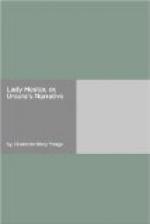We were glad to send him back to Eton, out of the sound of his poor sister’s voice; though he went off very mournfully, declaring that he should be even more wretched there without Trevor than he was at home; and that he never should do any good without him. But there he was wrong, I am thankful to say. Dear Trevor was more a guide to him dead than living. Trevor’s chief Eton friend, young Maitland, a good, high-principled, clever boy, a little older, who had valued him for what he was, while passing Alured by as a foolish, idle little swell, took pity upon him in the grief and dejection of his loss—did for him all and more than Trevor could do, and has been the friend and blessing of his life, aiding the depth and earnestness that seemed to pass into our dear child as he hung over the dying lad. Yes, Trevor Lea and John Maitland did for our Trevorsham what all our love and care had never been able to do.
Meantime Hester’s illness took its course. The chill of that icy water had done great harm, and there was much inflammation at first, leaving such oppression of breath that permanent injury to the lungs was expected, and therefore it was all the sadder to see the dumb despair with which she returned to understanding, I can hardly say to memory, for I believe she had never lost it for a moment.
Hopeless, heedless, reckless, speechless, she was a passive weight, lying or sitting, eating or drinking as she was bidden, but not making any manifestation of preference or dislike, save that she turned rigidly and sullenly away from any attempt to read prayers to her.
She asked no questions, attempted no employment, but seemed to care for nothing, and for weeks uttering nothing but a “yes,” “no,” or a mechanical “thank you.” Jaquetta tried to caress her, by force of nursing and pity. Jaquetta really had come to a warm tender love for her, but she sullenly pushed away the sweet face, and turned aside.
We never ventured to leave her alone, and this, after a time, began to vex her. She bade us go down once or twice, and tried to send away Mrs. Rowe; and at last, when she found it was never permitted, she broke out angrily one day, “You are very absurd to take so much trouble to hinder what cannot make any difference.”
It made one’s blood run cold, and yet it was a relief that the silence was broken. I can’t tell what I said, only I implored her not to think so, and told her that her having been rescued was a sign that Heaven would have her repent and come back, but she laughed that horrible laugh. “Do you think I repent?” she said; “No, only that I left it to that fool! I should have made no mistakes.”
I was too much horrified to do anything but hide my eyes and pray. I thought I did not do so obviously, but Hester saw or guessed, stamped at me, and said, “Don’t; I will not have it done. It is mockery!”
“Happily you cannot prevent our doing that, my poor Lady Hester,” I said.




